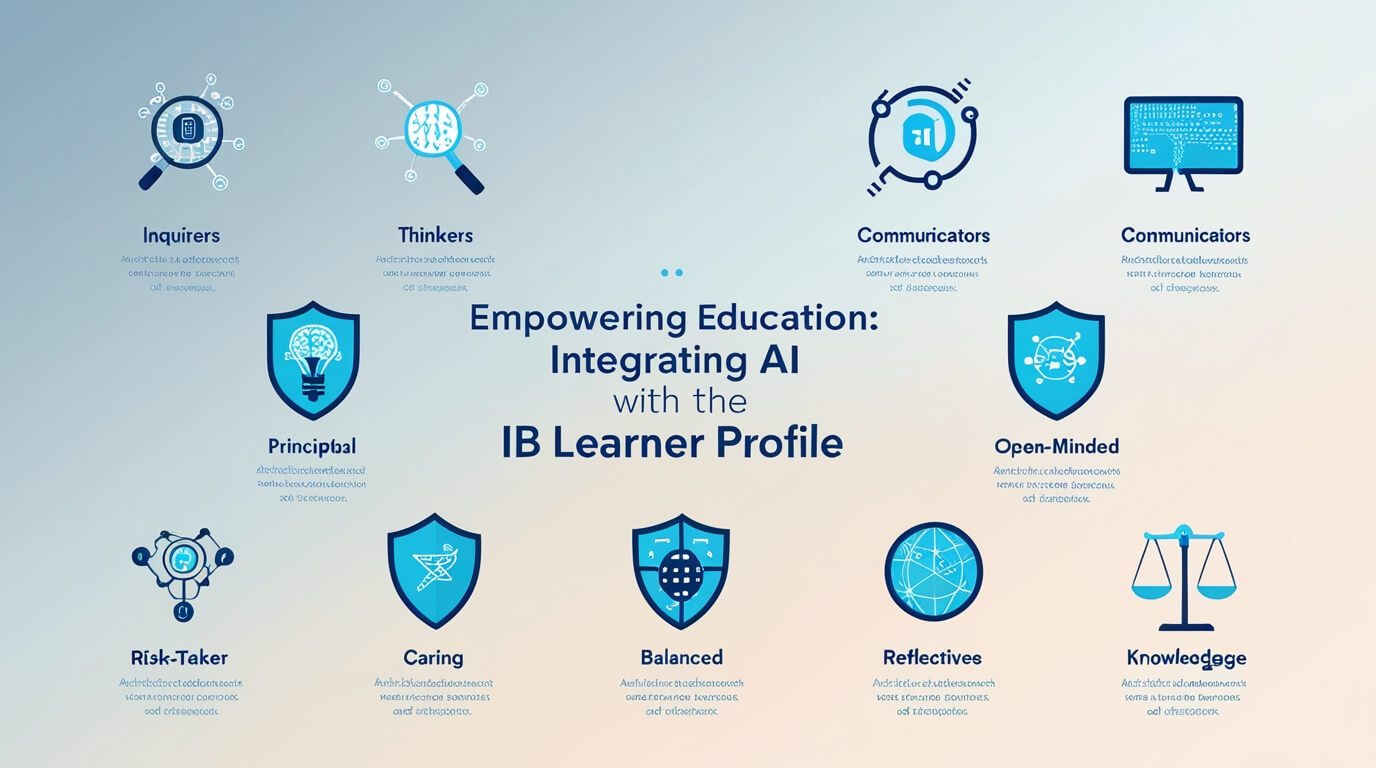Artificial Intelligence has been integrated into education for the past few years. In the rapidly changing academic landscape, this integration provides new opportunities to improve learning outcomes and cultivate important abilities in students. At Knowledgeum Academy, an accredited IB World School, we are committed to using AI to empower our students and align with the IB Learner Profile, which promotes the development of well-rounded, curious, and compassionate people. Here's how AI is changing education and improving the IB Learner Profile.
AI technologies promote curiosity and autonomous research, which are essential characteristics for inquirers. Students can ask questions and receive quick, individualised solutions using AI-powered platforms such as educational chatbots and intelligent tutoring systems. These technologies foster an inquiry culture by giving students the tools they need to investigate issues in depth and at their own pace. Furthermore, AI can assist in discovering knowledge gaps, stimulating further research and instilling a love of learning.
AI improves the acquisition and retention of knowledge. Adaptive learning systems personalise educational content to match the individual needs of each student. These systems use individual performance data to alter the intensity and style of training, ensuring that students are suitably pushed and can learn concepts. AI also improves access to a wide range of digital materials, making it easier for students to gain information across multiple fields.
The IB Learner Profile emphasises critical thinking and problem-solving skills. AI helps students develop these skills by presenting complicated, real-world scenarios for them to solve. AI-powered simulations and games, for example, create immersive worlds in which students must use their knowledge and think critically to overcome problems. These experiences help students develop strong analytical skills and the ability to approach challenges from several angles.
Effective communication is essential in the twenty-first century. AI solutions like language processing apps and virtual collaboration platforms help pupils improve their communication skills. AI-powered language learning apps provide tailored feedback and practice opportunities, allowing students to increase their proficiency in a variety of languages. Furthermore, AI-enabled collaborative technologies enable students to communicate and work together seamlessly across geographical boundaries.
AI can help Learners acquire principled behaviour by giving them ethical frameworks and scenarios to navigate. AI-driven debates about digital citizenship, data privacy, and ethical technology use, for example, can encourage students to consider their values and actions. These exercises emphasise the significance of integrity, justice, and accountability, which corresponds to the principled part of the IB Learner Profile.
AI promotes open-mindedness by exposing Learners to a variety of ideas and cultures. Recommendation algorithms on educational platforms can propose content from multiple perspectives, encouraging students to evaluate and appreciate opposing viewpoints. Virtual exchange programmes and AI-mediated language translation technologies also improve cross-cultural communication, allowing pupils to appreciate and comprehend global variety.
AI can improve both the emotional and social components of schooling. AI-powered social-emotional learning (SEL) tools can help kids build empathy, resilience, and emotional intelligence. For example, virtual characters and scenarios can be utilised to teach kids about the consequences of their choices, developing caring and compassionate behaviour. Furthermore, artificial intelligence can help teachers identify kids who may require additional emotional support, allowing for prompt and customised interventions.
Encouraging learners to take chances and face new challenges is critical for their development. AI-powered settings create safe areas for experimentation and innovation. Students can work on projects that stretch their knowledge and skills using virtual labs, coding platforms, and creative AI applications. These encounters improve students' confidence and willingness to take intellectual risks.
A balanced education involves encouraging both academic and personal development. AI contributes to this balance by giving tools for time management, stress reduction, and overall well-being. For example, AI-powered applications can suggest tailored study timetables, mindfulness exercises, and physical activity routines. These tools assist students in striking a healthy balance between their academic commitments and personal lives.
Reflection is an essential component of the IB Learner Profile. AI can aid with reflective activities by providing insights and feedback on student performance. Learning analytics dashboards give detailed progress reports that assist students and educators in identifying strengths and areas for improvement. AI-powered journaling apps allow students to record their learning experiences and reflect on their personal development.
At Knowledgeum Academy by integrating AI with the IB Learner Profile there is an improvement in educational outcomes while also preparing students to succeed in an increasingly complex and interconnected world. By utilising AI, we can help Learners become inquirers, knowledgeable thinkers, communicators, principled, open-minded, caring, risk-takers, balanced, and introspective individuals. As we accept technology innovations, we remain committed to creating a holistic and forward-thinking learning environment
AI at Knowledgeum Academy personalizes learning experiences, supports student inquiry, and enhances critical thinking skills through adaptive technologies.
Integrating AI helps students develop skills such as critical thinking, problem-solving, and global awareness, aligning with the IB's educational goals.
Yes, AI tools like educational games and adaptive learning platforms at Knowledgeum Academy can increase student engagement by offering personalized challenges and feedback.
No, AI complements teaching by providing insights, automating administrative tasks, and offering personalized learning experiences, allowing teachers to focus more on individual student needs.
The integration of AI at Knowledgeum Academy prepares students for future careers by equipping them with advanced technological skills and a deep understanding of AI's role in society.
© Knowledgeum
